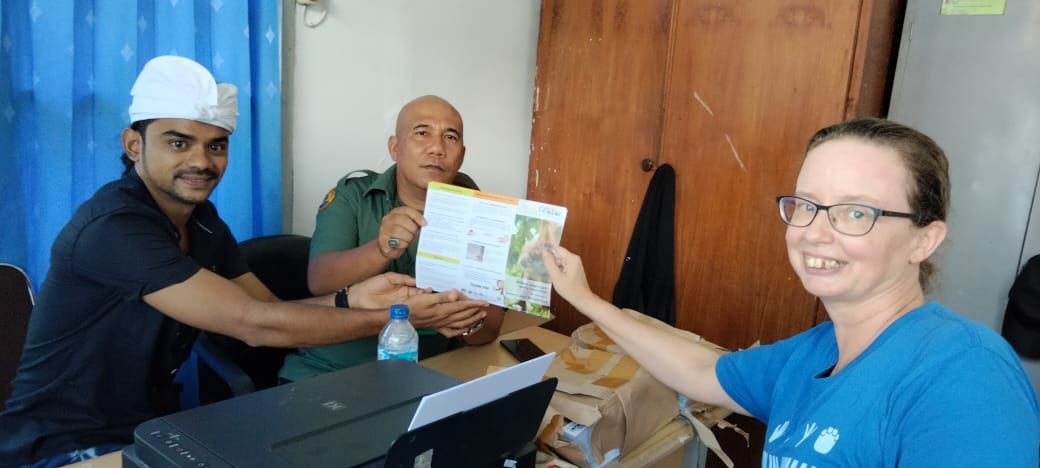
Covid-19 and safe jungle trekking.
SHORTCUT click below to download
national park rules leaflet (english); peraturan TNGL (bahasa Indonesia)
safe selfie poster (english); poster selfie aman (bahasa Indonesia)
Orangutans, gibbons and monkeys can catch Covid-19 and other diseases from humans.
It is extremely important that everyone going trekking follows the national park rules.
You can do 3 simple things to help protect them
➡ keep a minimum distance of 10 meters,
➡ do not feed them or give them drinks,
➡do not take or post photos that show you less than 10 meters from wildlife.
Please have a read of the following info to learn about the scientific background, what action has been taken and what YOU can do.
BACKGROUND: apes, monkeys and human diseases.
Scientists have expressed concern about the impact of the Covid-19 pandemic on biodiversity conservation and non-human primates . We have known for a long time that respiratory infections, such as pneumonia, tuberculosis and influenza, are a serious threat to great apes and can have devastating consequences. However, orangutans, especially wild populations, are underrepresented in literature on great apes and infectious diseases.
A recent study has shown that all great apes and all African and Asian monkeys are highly susceptible to SARS-CoV-2 infection. In January and September 2021 captive gorillas at two american zoos were confirmed positive forSARS-CoV-2.
Increased contact with humans has long been highlighted as a significant risk factor that exposes orangutans to infectious diseases . Orangutans’ susceptibility to infectious diseases can be exacerbated by numerous stress factors such as altered behaviours (more time on ground) and habituation (close human contact). Tourism that allows close contact between primates and humans is a major problem.
There is a very real possibility that COVID-19 could transmit from humans to orangutans and thus be a threat to their future survival.
[Corlett et al., 2020; Santos et al., 2020] [Köngden et al., 2008; Buitendijk et al., 2014; Scully et al., 2018; Emery Thompson, 2018; Patrono et al., 2018; Glasser et al., 2021] [Mul et al., 2007; Nurcahyo et al., 2017; Stuart et al., 2020; Philippa and Dench, 2019] [Melin et al., 2020] [Orams 2002; Köndgen et al., 2008; Foitová et al., 2009; Dellatore et al., 2009; Muehlenbein et al., 2010; Kuze et al., 2012; Russon et al., 2016; Nurcahyo et al., 2017; Mynarova et al., 2016; Dunay et al., 2018; Stuart et al., 2020].[Muehlenbein, 2010; Moorhouse et al., 2015]. [Lappan et al., 2020]
ACTION taken by national park authorities and Green Hill.
🟢To reduce the risk of Covid-19 passing from humans to apes and monkeys scientists advised that everyone concerned should strictly follow international guidelines from the IUCN on great ape health and tourism.
🟢To safeguard the orangutan population, the GLNP authorities in Bukit Lawang acted decisively to reduce the risk of transmission by distributing a detailed information leaflet (english / bahasa indonesia) to all guest houses and the local tourist guide association on the 17th March 2020, and by closing the National park Park to all visitors on the 18th March 2020. The National Park is now open.
In addition to our long running #keepwildlifewild campaign Green Hill worked intensively with the local authorities of Gunung Leuser National Park to produce and distribute a variety of information in response to covid to promote awareness of safe trekking practies :
✅ Covid-19 specific flyers and stickers
✅ optimized for social media (see below)
✅ this website page
✅ Safe selfie leaflet and mobile selfie frame.
✅“mobile education conservation units”
40+ plastic rain canopys for the becak (tuk-tuk) with the safe selfie poster on the back and COVID specific info on the front.
✅collaboration with @shirohyde, an Indonesian artist and influencer, to produce an educational comic strip aimed at Indonesians.
✅publication of a scientific paper which analysed selfies on Instagram for evidence of non compliance with national park rules.
- presentation of the paper at the 2021 PSGB conference.
ONGOING ACTION
Green Hill collaborated with a team of highly respected scientists from Oxford Brookes University and published a scientific paper. The research used orangutan selfies posted on Instagram to systematically assess compliance with national park rules (keep distance of 10m / no feeding wildlife) and to assess the behaviour of the orangutans.
🟢 100% of photos that contained a human and an orangutan showed inappropriate human behaviours (direct contact/very close, feeding orangutans) providing direct evidence of noncompliance with the 10m distance rule.
🟢 87% of photos additionally showed orangutans performing abnormal positional behaviours.
🟢Human visitors to the national park (guests, guides etc) do not appear to perceive that their behaviours present a risk to the orangutans.
The seemingly simple way to mitigate the risks illustrated by our study is have rules for visitors to the national park, ensure rules are complied with by all stakeholders and strictly enforced by national park authorities. Despite having clear rules there appears to be a lack of awareness, limited support for and a worrying lack of interest and apathy from stakeholders (e.g. orangutan ngo’s, guest houses, tour operators etc) in the promotion of such information.
Here at Green Hill we will be continuing our long running awareness programme #keepwildlifewild and liaising with appropriate bodies (national park, ngo, guide association etc) to promote awareness of this information and provide training etc
UPDATE:
August 2023:
- revision and reprint of the official national park rules brochure.
- liaison with local branch of Indonesian Guide Association (HPI) & National Park Authorities to discuss distribution of rules brochure.
- work with the guide association to design an information letter which was distributed electronically to all members. CLICK HERE to download.
November 2023:
- redesign, reprint and distribute 53 plastic rain covers for the becak (tuk-tuks): disease risk and safe trekking information on the front and biodiversity gallery on the back to promote awareness that there is more to Bukit Lawang than just orangutans.
What YOU can do.
It is absolutely crucial that in order to minimize the risk of orangutans catching human diseases or becoming ill due to long term stress (caused by human contact from visitors) that visitor education is successful and we call upon everyone concerned (visitors, guides, guide association, national park, guest houses, trek operators, NGOs etc) to help safeguard Critically Endangered orangutan populations by raising the profile of this information:
🟢 promote awareness of this issue by sharing information on social media and websites; you can share info direct from Green Hill posts and pinned stories or download the educational info (rules brochure and safe selfie poster) and post it.
🟢 do not take or post photos on social media that show close contact…even if you think the distance is ok it can look closer.
🟢 if you see inappropriate photos of orangutans and humans on socmedia (instagram, facebook, youtube) please do not like or share.
- report it to the platform to make social media more accountable.
- comment constructively to make the poster aware of the rules, the impact of their behaviour and posting #badselfies. Politely ask them to remove photo.
ALL guest houses, hotels and tour operators in Bukit Lawang should:
download copies of the OFFICIAL national park rules brochure and safe selfie poster, display it on their website and social media channels.

































